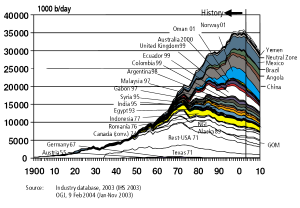

| Visitors Now: | |
| Total Visits: | |
| Total Stories: |

| Story Views | |
| Now: | |
| Last Hour: | |
| Last 24 Hours: | |
| Total: | |
It Seems the Preppers are the Only People Who Fully Understand What Peak Oil Really Means…
Tuesday, November 27, 2012 9:08
% of readers think this story is Fact. Add your two cents.
By Tom Dennen
Remember ‘Peak Oil’ and all the hype around it? It faded from the front pages because the results weren’t as bloody or immediate as Katrina or Sandy, Syria, Cast Lead or Pillar of Cloud, but most probably because people looked at a very long ‘downslope’ with oil not running out for decades anyway.
 But consider this little thought that suddenly occurred to me while creating a rainwater harvesting system for my local community:
But consider this little thought that suddenly occurred to me while creating a rainwater harvesting system for my local community:
A 100 kg living human being has about 70% or 70 kg of water integral to the system’s sustainability – three or four days without water means death because as the person enters a ‘dehydrative decline’ all of the internally integrated water-based delivery systems start to fail when about 10 to 15% of the water is gone.
“The patient dies” with about 50 kg of water still in the body – what they call…
a ‘good-looking’ corpse.
Photo: Mark A. Vargas, Flickr Creative Commons
Is that what happens when the planet’s oil levels drop to 15 or 20% of what’s needed?
After ‘Peak Oil’ we know we are running out of our industrialized economic life blood, and we know that petrol cannot be topped up and will become more and more scarce and more and more expensive on an accelerating and asymptotic curve ‘peaking’ again soon enough when we slip below the 15 – 20% life-sustaining amount needed, no matter how much is left below ground or even undiscovered on the downslope side.
The social and economic downsides cannot really be imagined after two hundred years of addiction to cheap energy.
My point is that we need to take very seriously the “Preppers” of the world and their solutions – basically rain water harvesting and Permaculture and apply them wherever we are.
An increasing number of theorists believe some peak in world oil production has already occurred. After Hurricane Katrina, Saudi Arabia admitted that it simply could not increase production to make up for the loss of Gulf of Mexico oil rigs. This was widely believed, albeit speculatively, to be the beginning of a final oil crisis in which there will be no choice but to radically curtail the use of oil.
(South Africa is another country buying oil with gold rather than dollar reserves, a clue to the disparity in the exchange rate ratio and the pump prices?)
A week after Katrina long gas lines were reported in Denver, Indianapolis, Hartford, Conn., Atlanta and Orlando, Fla., among other cities across America. In North Carolina’s capital city Charlotte, “between 13% and 15% of stations had no gasoline and prices soared as much as 70 cents a gallon in those stations that still had fuel to peddle.
” At that time, according to the Petroleum Industry Research Foundation, global demand was expected to grow by nearly two million barrels a day… while the world’s capacity to refine and process the stuff wasn’t expected to grow by even half that.
Whatever happens when the oil ‘dehydrative decline’ starts and we hit the 15 to 20% shortfall across the planet’s oil-based delivery systems, remember whatever joyful memories of the past you have.
.gif)



